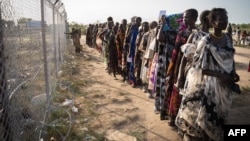Ten years ago, the South Sudanese people voted to secede from Sudan, and amid high hopes and much jubilation, the world’s newest nation was born on July 9, 2011.
But the euphoria of those early days all too soon turned into despair in many parts of the East African nation, because by December 2013, a power struggle between President Salva Kiir and Vice President Riek Machar escalated into a civil war. The civil war formally ended with a peace agreement signed in 2018. Yet violence continues, indeed, is escalating, according to a February report by the UN Commission on Human Rights in South Sudan.
A statement from the Troika – the United States, United Kingdom, and Norway – said, “The first ten years of this young country’s history have seen much suffering, due to conflict related abuses, famine, flooding, and disease… The Troika urges immediate action to ensure access for humanitarian aid and to end violence against South Sudanese and the aid workers who serve them… Few of the tangible benefits of [the 2018 peace agreement] are seen by ordinary citizens.”
In a separate statement, USAID Administrator Samantha Power added, “South Sudan’s leaders have squandered the world’s goodwill, the country’s oil revenues, and countless opportunities to lift up their population of 12 million people.Today, nearly two-thirds of South Sudan’s population faces hunger, more than ever before. Additionally, 3.8 million people — a third of the nation — remain displaced; 2.2 million as refugees in neighboring countries, and 1.6 million internally.”
South Sudan’s government must serve its citizens and its leaders must put their people first, said the Troika and Administrator Power, respectively. In addition to the cessation of violence, “preparations for peaceful, credible, and inclusive elections must begin in earnest; unified forces must be created; transitional justice mechanisms must be fully established; and key financial reforms need to happen as quickly as possible.”
Now, as South Sudan enters the second decade of its existence, “the Troika welcomes the progress that has been made but urges the signatories to accept accountability for their commitments and go much further, much faster;” and Administrator Power said, “It is time for South Sudan’s leaders to…deliver on the promises of the peace agreements they signed, and to start the difficult task of building the nation they dreamed of for decades in their struggle for independence.”






